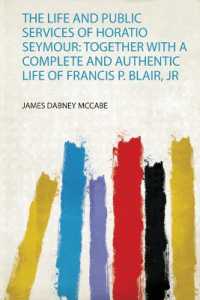- ホーム
- > 洋書
- > 英文書
- > Psychology
Full Description
Winner, 2025 Book Prize of the American Psychoanalytic Association
For decades, psychoanalysis has provided essential concepts and methodologies for critical theory and the humanities and social sciences. But it is also, inseparably, a clinical practice and technique for treatment. In what ways is clinical practice significant for critical thought? What conceptual resources does the clinic hold for us today?
Carolyn Laubender examines cases from Britain and its former colonies to show that clinical psychoanalytic practice constitutes a productive site for novel political thought, theorization, and action. She delves into the clinical work of some of the British Psychoanalytic Society's most influential practitioners—including Anna Freud, Melanie Klein, Wulf Sachs, D. W. Winnicott, Thomas Main, and John Bowlby—exploring how they developed distinctive and politically salient practices. Laubender argues that these figures transformed the clinic into a laboratory for reimagining race, gender, sexuality, childhood, nation, and democracy. By taking up the clinic as both a site of inquiry and realm of theoretical innovation, she traces how political concepts such as authority, reparation, colonialism, decolonization, communalism, and security at once informed and were reformed by each analyst's work.
While psychoanalytic scholarship has typically focused on its intellectual, social, and political effects outside of the clinic, this interdisciplinary book combines history with feminist and decolonial social theory to recast the clinic as a necessarily politicized space. Challenging common assumptions that psychoanalytic practice is or should be neutral, apolitical, and objective, The Political Clinic also considers what progressive clinical praxis can offer today.
Contents
Acknowledgments
Introduction: On Neutrality and Other Clinical Fictions
Part I. Democracy's Children
1. On Good Authority: Anna Freud, Child Analysis, and the Politics of Authority
2. Beyond Repair: War, Reparation, and Justice in Melanie Klein's Clinic
Part II. Empires of Mind: On Colonialism and Decolonization
3. Traveling Analysis: Wulf Sachs, Racial Justice, and the (De)colonial Clinic in South Africa
4. Dreaming of "Black Mummy": Race, Gender, Decolonization, and D. W. Winnicott
Part III. From the Couch to the Iron Curtain: Psychoanalysis During the Cold War
5. The Communal Clinic: Therapeutic Communities, Heteronormativity, and the Cold War
6. Communists, Astronauts, and "Extreme Feminists": John Bowlby and the Pursuit of (National) Security
Epilogue: Here, There, and Everywhere—Now
Notes
Bibliography
Index







